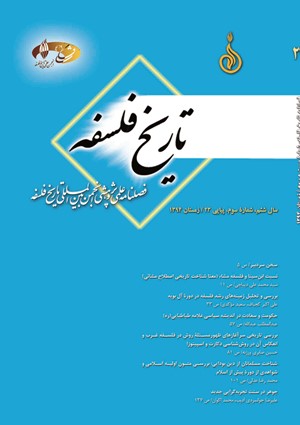حکومت و سعادت در انديشه سياسي علامه طباطبايي (ره)
محورهای موضوعی : Etymology of philosophical terms
1 - دانشگاه علامه طباطبايي
کلید واژه: علامه طباطبايي حکومت ديني سعادت فطرت حاکميت اسلام,
چکیده مقاله :
سعادت از مفاهيم کليدي در انديشه فلاسفه و بخصوص حکماي اسلامي است و از فلاسفه يونان باستان گرفته تا اديان توحيدي و دين اسلام به مقوله سعادت آدمي پرداختهاند. از منظر غالب فلاسفه، هدف سياست و تشکيل حکومت، نيل به سعادت است؛ هرچند در تعريف سعادت تعاريف متفاوتي ارائه شده است. در اين مقاله تلاش شده جايگاه سعادت در انديشه علامه طباطبايي بعنوان يک فيلسوف و مفسر برجسته معاصر مورد بررسي قرار گيرد. از ديدگاه علامه طباطبايي جامعهيي به سعادت دست مييابد که حرکتش در مسير فطرت انساني و نظام آفرينش باشد. دين که از طرف خداوند تشريع شده تفصيل فطرتي است که بصورت اجمال آن را در درون خود مييابيم؛ بنابرين دين ـ اسلام ـ ملاک تشخيص ايمان و عمل صالح است. از اينرو، جامعهيي به سعادت دنيوي و اخروي ميرسد که دين منطبق با فطرت بر آن حکومت کند.
Happiness is one of the key terms used by philosophers, in general, and by Islamic sages, in particular. From ancient Greek philosophers to the thinkers advocating monotheistic religions and Islamic philosophers, all have dealt with the issue of human happiness. In the view of the majority of philosophers, the ultimate goal of politics and establishing a government is attaining happiness. However, this concept has been defined differently by different thinkers. In this paper, the author has tried to explore the place of happiness in the philosophy of ‘Allamah Tabataba’i, the distinguished contemporary philosopher and interpreter of the Qur’an. In his view, a society attains happiness when it moves in the line of human primordial nature (fitrah) and the system of creation. A religion which has been sanctioned by God is the extension of a detailed primordial nature which exists in our nature. Thus religion – Islam – is the criterion for distinguishing faith and good deed. Accordingly, a society will attain worldly and otherworldly happiness if it is ruled by a religion which conforms to Man’s primordial nature.
قرآن كريم.#
ابنمنظور، محمدبن مكرم، لسان العرب، قم، نشر ادب حوزه، 1405ق.#
ارسطو، اخلاق نيکوماخوس، ترجمه محمدحسن لطفي، تهران، طرح نو، 1378.#
داوري اردكاني، رضا، فلسفه مدني، تهران، شوراي عالي فرهنگ و هنر، 1366.#
راغب اصفهاني، حسين بن محمد، مفردات الفاظ قرآن، ترجمه حسين خداپرست، قم، نويد اسلام، 1387.#
طباطبايي، محمدحسين، الميزان في تفسير القرآن، محمدباقر موسوي همداني، قم، دارالعلم، 1363.#
طباطبايي، محمدحسين، الميزان في تفسير القرآن، بيروت، موسسه الاعلمي للمطبوعات، 1971م.#
طباطبايي، محمدحسين، «ولايت و زعامت»، در: مرجعيت و روحانيت، تهران، شرکت سهامي انتشار، بيتا.#
طباطبايي، محمدحسين، شيعه در اسلام، تهران، نشر ادباء، 1388.#
طباطبايي، محمدحسين، روابط اجتماعي در اسلام به ضميمه چند رساله ديگر، محمد جواد حجتي کرماني، قم، بوستان کتاب، 1387.#
طباطبايي، محمدحسين، عقايد و دستورهاي ديني، بيجا، بينا، بيتا.#
طباطبايي، محمدحسين، بررسيهاي اسلامي، ب، قم، بوستان کتاب، چ2، 1388.#
طباطبايي، محمدحسين، ترجمه تفسيرالميزان، ترجمه محمدباقرموسوي همداني، قم، دفتر انتشارات اسلامي، چ5، 1374.#
طباطبايي، محمدحسين، شيعه، به كوشش خسروشاهي، قم، مؤسسه بوستان کتاب، چ2، 1387.#
طباطبايي، محمدحسين، قرآن در اسلام، بنياد علوم اسلامي، چ3، 1361.#
طباطبايي، محمدحسين، مباحث علمي در تفسير الميزان، قم، انتشارات اسلامي، 1384.#
طباطبائي، سيدمحمدرضا، مفهوم سعادت؛ کليد متدولوژيک فهم انديشههاي سياسي اسلامي، روششناسي در مطالعات سياسي اسلام، علياکبر عليخاني و همکاران، تهران، دانشگاه امام صادق (ع)، چ1، 1386.#
فارابي، ابونصر، انديشههاي اهل مدينه فاضله،ترجمه سيدجعفرسجادي، تهران، انتشارات طهوري، 1361.#
فارابي، ابونصر، السياسة المدنيه، تهران، انتشارات سروش، 1376.#
فارابي، ابونصر، تحصيل السعادة، ترجمه علياكبر جابري مقدم، قم، دارالهدي، 1384.#
فارابي، ابونصر، التنبيه علي سبيل السعاده، تهران، حكمت، 1371.#
لکزايي، نجف، انديشه سياسي صدرالمتألهين، قم، بوستان کتاب، 1381.#
ملاصدرا، الحکمة المتعاليه في الاسفارالاربعه، قم، انتشارات مصطفوي، 1383.#
ملاصدرا، المبدأوالمعاد، تهران، مرکز نشر دانشگاهي، 1362.#
ملاصدرا، تفسيرقرآن كريم، قم، انتشارات بيدار، 1378.#
ملاصدرا، شرح اصول کافي، محمد خواجوي، تهران، مؤسسه مطالعات و تحقيقات فرهنگي، 1376.#
مهاجرنيا، محسن، انديشة سياسي فارابي، قم، بوستان کتاب قم، 1380.#
نيلي احمدآبادي، هاجر؛ کرباسيزاده، علي، «آزادي اجتماعي از ديدگاه علامه طباطبايي (ره) و کانت»، فصلنامه حکمت و فلسفه، س8، ش3، پاييز، 1391.#

